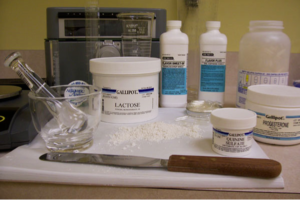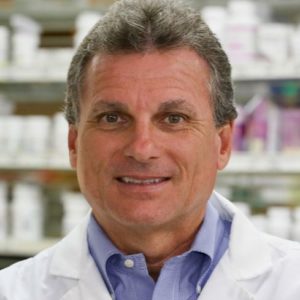- Compounding Pharmacies: Safety Blind Spot (morningconsult.com)
To protect patients, pharmaceutical manufacturers must monitor any adverse events we hear about with respect to the drugs we produce and report those adverse events to the Food and Drug Administration, as required by law...Developing and maintaining an accurate safety profile of a product is a joint responsibility between the manufacturer of the product, the FDA and consumers...As noted, reporting of adverse events to the FDA is a critical component of the patient safety protection system...While some compounding pharmacy adverse events are now haphazardly reported — FDA just last week sent warning letters to drug compounding pharmacies in Tennessee and Virginia following reports — there is a giant gap in that system that may put patients at risk —adverse events with respect to drugs made by compounding pharmacies are generally not required to be reported to anyone...Regardless of how quickly states work to improve their oversight of sterile compounding, an immediate step should be to require reporting of adverse events. If states do not act to require this kind of reporting, Congress should step in and mandate it. Until then, patient safety is at risk.
- IACP’s 2016 Compounders on Capitol Hill Report (iacprx.org)
IACP Members Go to the Hill with Three Actionable Asks
This year, IACP went to the Hill with three Asks, each with a Congressional action item. IACP and its legislative team have worked tirelessly for the past year emphasizing FDA should be implementing DQSA (Drug Quality and Security Act) according to congressional intent!
- Issue #1 Support Pharmacists: Sign the Bipartisan Letter to FDA Led by Representatives Chris Stewart and Henry Cuellar.
- Issue #2 Support Letter to Chairman Chaffetz and Ranking Member Cummings to Request House Oversight and Government Reform Hearings on FDA's Implementation of DQSA.
- Issue #3 Support Pharmacists: Sign the Senate Letter to FDA Regarding Office-use.
- Medicare Part D spending on compounded drugs is skyrocketing (statnews.com)
As federal regulators try to crack down on compounding pharmacies over safety concerns, a new report finds that spending by the Medicare Part D program for these medicines rose more than 600 percent over the past decade. And federal auditors say the trend raises questions about whether the drugs, which are customized for specific patient needs, were medically necessary or dispensed appropriately...Between 2006 and 2015...spending for compounded drugs went from $70 million to $508 million, a 625 percent increase...By comparison, spending for all prescription drugs covered by the program rose 167 percent during the same period...Center for Medicare and Medicaid Services...will review the data brief OIG (Office of the Inspector General) released as it continues to monitor drug spending and trends in Part D...the International Academy of Compounding Pharmacists...does not condone marketing or billing practices involving fraud, waste or abuse…Clearly, proper controls around the billing of compounded medications are needed to ensure patients can still access these important medications. It is apparent from the OIG report those proper controls are not in place...
- Safety issues at compounding pharmacy underscore oversight problems (statnews.com)
A tussle between a Texas compounder and the Food and Drug Administration underscores the ongoing difficulties that regulators can have overseeing this controversial portion of the medical supply chain...The episode also illustrates how varying approaches taken by state and federal authorities to regulating compounding pharmacies can leave doctors and patients confused about the safety of medicines...the FDA issued a health alert recommending that doctors and patients should toss sterile medicines made by IV Specialty. The agency found numerous safety issues during an inspection...the compounder refused an agency recommendation to halt production or issue a recall until the problems were fixed...The FDA...lacks authority to force the compounder to take these steps...In response to the FDA actions, the state agency (Texas State Board of Pharmacy) sent its own inspector to review IV Specialty facilities...According to our rules, they’re doing what they need to do. We didn’t see anything that we felt would prompt us to immediately close them down...state regulations are not as stringent as FDA regulations..."We’re still in the early stages of figuring out how state and federal regulation schemes are going to work," said Elizabeth Jungman, director of public health programs at Pew Charitable Trusts, which tracks compounding issues. "So it’s confusing for patients and physicians to see disagreement between regulators at state and federal levels."
- Lax FDA Oversight Of ‘Compounded Drugs’ Is A Matter Of Life And Death (forbes.com)
People naturally assume that the medicines prescribed by doctors are tightly regulated and have been approved by the Food and Drug Administration, but that’s not true. Loopholes in the regulations that set the standards for a practice called "drug compounding" have enabled dangerous products to injure and kill untold numbers of unsuspecting patients...FDA exempted compounding pharmacies from many of the manufacturing, labeling and other requirements other drugs are subject to...FDA does not require pharmacies to report adverse events associated with compounded drugs...the FDA has the authority to take action when compounding pharmacies violate the law and can act quickly if there is an "imminent hazard to public health," regulators have failed in several critical areas, including inspecting pharmacy records, enforcing quality standards and being able to identify the facility that made a particular drug...In order to create an acceptable risk-benefit paradigm for drug compounding, FDA needs to increase its scrutiny over compounding pharmacies. When a pharmacy is allowed to morph into a large-scale drug manufacturer without adequate oversight, it’s a matter of life and death.
- FDA defines the ability of compounders to make approved medicines (statnews.com)
In its latest (to) bid to set parameters around compounding, the US Food and Drug Administration...issued a pair of draft guidelines to clarify when compounding pharmacies are permitted to make versions of commercially available medicines...federal law currently states that a compounder generally shouldn’t make copies of drugs that are approved for sale, the agency is getting more specific and wants to ensure that a true clinical need exists before a compounded version of an approved medicine drug is made for a patient...A key issue has been the extent to which compounders can make medicines for patients in ways that may cross the line into more conventional drug manufacturing. The new law attempts to create boundaries, although the latest guidelines are designed to refine the FDA interpretation... the guidelines would permit compounders to make versions of brand-name drugs when a shortage exists or the brand-name medicine has been discontinued. Another example meeting the threshold of patient need might be a required change in formulation...But safety is not the only issue in play here. For instance, pointing to a lower price...a compounded version would be cheaper than a brand-name drug — is not justification for compounding an FDA-approved medicine...these are only draft guidelines — guidances in regulatory parlance — and are not set in stone.
- The most overtrained and under utilized profession in America (thehill.com)
In the more than thirty years I have practiced pharmacy, I have witnessed a tremendous evolution in the profession. The clinical foundation and training of a pharmacist graduating today is leaps and bounds above where I started my practice. However, one thing has not changed: a pharmacists’ role in patient care goes well beyond dispensing medications...Today, as before, many pharmacists provide patient-centered services...We are the front line of the health care team and often see patients more than any other provider. Pharmacists have become the most over-trained and under-utilized professionals in America...While doctors should remain the quarterbacks, pharmacists must be given "provider status" so the profession is able to be the integral part of the health care team we are trained to be...With provider status, pharmacists would be added to the list of Medicare providers which would not only allow for the best possible care for patients but would also ensure it is done in the most cost-effective manner...In my short time in Washington I have come to realize just how hard it can be to advance commonsense reform...a bipartisan majority of 272 members have cosponsored the Pharmacy and Medically Underserved Areas Enhancement Act introduced by Representative Brett Guthrie. This legislation simply gives pharmacists provider status...let’s move forward...to improve access to quality and affordable health care for all Americans.
- Medicare fraud investigators wary of soaring compounded drug prices (medcitynews.com)
Government spending on compounded drugs that are handmade by retail pharmacists has skyrocketed, drawing the attention of federal investigators who are raising fraud and overbilling concerns...Spending on these medications in Medicare’s Part D program, for example, rose 56 percent last year, with some of the costliest products, including topical pain creams, priced at hundreds or thousands of dollars per tube. The federal workers’ compensation program has also seen a recent spike in spending...The spending jump, along with a sharp increase in the number of patients getting the compounded drugs "may indicate an emerging fraud trend,"...
- Compounding Pharmacists Imprisoned for Dispensing Adulterated Drugs (pharmacytimes.com)Two Pharmacists Sentenced to Prison for Adulteration of Drugs in Connection with Alabama-Based Compounding Pharmacy (justice.gov)
Two compounding pharmacists from Alabama will spend a year in prison for distributing tainted drugs... The adulterated drugs were compounded at Advanced Specialty Pharmacy, which did business as Meds IV... David Allen...and William Timothy Rogers...pleaded guilty...to 2 misdemeanor violations of the Federal Food, Drug and Cosmetic Act...the 2...were sentenced to 12 months and 10 months in prison, respectively...also...1 year of supervised release after they get out of prison, and they’ll each have to pay a $5000 fine...Meds IV compounded...its own amino acid solution, then mixed it with other ingredients to create TPN (Total Parenteral Nutrition)...The amino acid solution happened to be contaminated with Serratia marcescens, and the TPN was prepared, packed, or held in insanitary conditions...the amino acid was prepared by Meds IV outside a laminar airflow workbench and was kept unrefrigerated, in a room that was not sterile, in a large pot sitting on the floor, sometimes overnight, before it was sterilized and used...Nine patients developed bloodstream infections and died, while others developed S. marcescens bloodstream infections but survived.
- Proposed legislation could heighten controversy over compounding pharmacies (statnews.com)FDA Issues Three New Draft Guidances (iacprx.org)
A congressional committee is proposing an amendment to a spending bill that may intensify the debate over the safety of compounded medicines...The House Appropriations Committee has introduced language that would alter a key requirement for pharmacists to make and dispense compounded medicines, which are generally customized for specific patient needs. And the language runs counter to a draft guidance that the US Food and Drug Administration released...that would govern compounding practices...Specifically, the amendment would allow pharmacists to compound medicines without needing prescriptions for individual patients. This has been a contentious issue in the wake of the 2012 outbreak of fungal meningitis that was tied to a compounding pharmacy and led to 64 deaths. The episode underscored confusion between federal and state oversight of compounders...the Drug Quality and Security Act went into effect to sort out enforcement authority...it...created two classes of compounders — traditional compounders who make medicines for individual patients, and others who resemble drug makers by making large amounts of a drug. These compounders must register with the FDA and are subject to greater federal oversight...The Pew Charitable Trusts...argued that the language proposed by the House committee would blur that distinction. And the nonprofit contended the change could jeopardize public safety...International Academy of Compounding Pharmacists..."The FDA continues to ignore clear congressional intent where the states have clearly indicated pathways in which pharmacies can participate in office-use compounding. The 2017 appropriations bill reinforces this intent."..."FDA’s draft guidance on anticipatory compounding is confusing at best and may ignore the clear language of bill when it comes to defining this practice,"…










